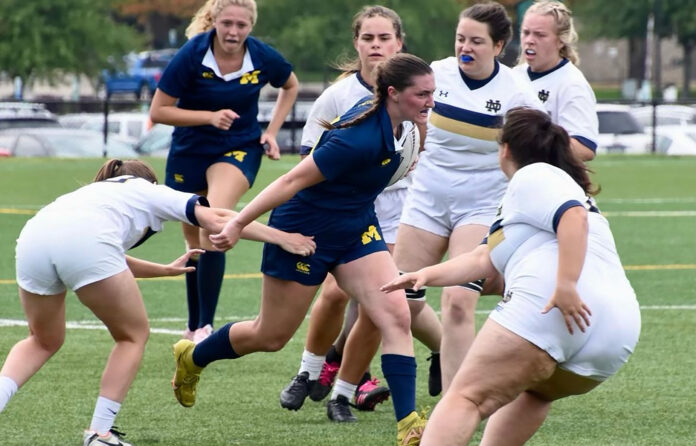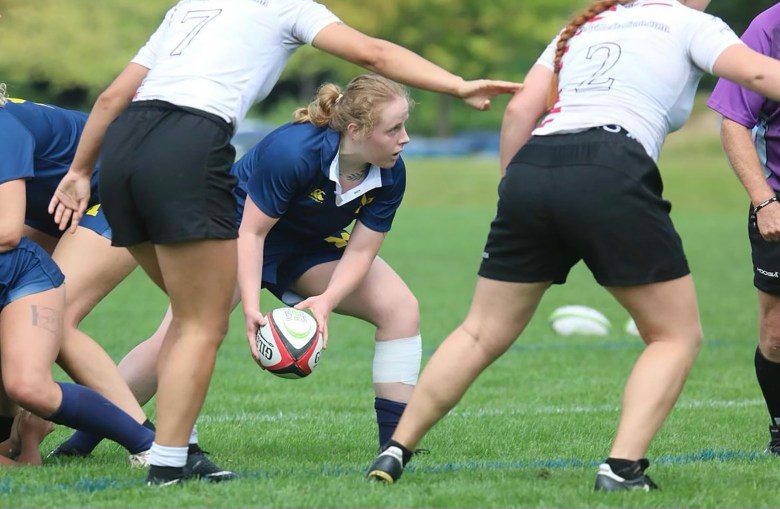
[ad_1]
Courtesy of Ella Mccalmont. Courtesy of Ella Mccalmont.
Courtesy of Ella Mccalmont.
The Michigan women’s rugby team is chasing history. It was crowned Division I National Collegiate Rugby Champions in 2022 and 2023, and will be pursuing a three-peat this winter. The team was the only Division I team to finish undefeated in 2023, and appropriately finished the year atop the coaches poll. The Wolverines have been and continue to be dominant — an unstoppable, bulldozing force plowing through a sport that has seen a boom in popularity.
It’d be easy to chalk up this dynasty to recruitment, an oft-told story of asymmetrical funding weighing the scales in favor of the big, well-endowed university. But that isn’t this team. In a constant fight for sufficient resources and unable to recruit outside of the school, the women’s rugby team has relied on its coaching and internal leadership to continue the legacy.
“Not being a school that has scholarship athletes,” Wolverines coach Jamie French told The Michigan Daily. “…We have to find people who can play rugby when they show up at the University of Michigan.”
Rugby’s athletic requirements are intense. It’s a hard-contact, play-through-the-pain sport with little breaks within the 40-minute halves. Finding players who are willing and able to learn a new sport after high school has proven to be a challenge for the Wolverines, but not one they shy away from. For French, a welcoming environment is necessary.
“We like to have an environment where people feel safe to try out a few things, learn what contact is like and make the decision from there,” French said.
Getting players from soccer, softball or rowing comfortable with full contact is a process, and ensuring their safe development is a staple of the team’s success. Senior fly-half and captain Katie Gale echoes her coach’s sentiment. She sees herself as a resource for people on the team who are aiming to become confident in their abilities.
“Rugby’s really confusing when you first start playing,” Gale told The Daily. “So being a positive support available to ask questions … no question is stupid.”
Despite its physicality, rugby requires multifaceted decision making and a developed understanding of the rules to effectively pick apart a defense. Not everyone is star USA rugby player Ilona Maher, and learning a foreign sport takes effort from those on and off the field.
Despite their grassroots recruiting scheme, once the whistle blows and the scrums commence, the Wolverines execute a sequenced offensive framework, tactfully weaving the ball with purpose. This consistency allows players to focus on their pod, their siloed role and creates a synergized team of groups.
“We have pods of three that are the pistons working in the middle, and the edge players operate around those positions,” French said. “If everything gets chaotic, you always go back to [that] shape.”
Despite the layered, mechanical structure of its offense, senior scrum-half Lauren Donatoni attributes their success against richer teams to Michigan’s propensity to deviate from rugby norms.
“(Varsity teams) get stuck in a pattern where (they) run this play and then (they) run this play and it’s just kind of the same thing over and over,” Donatoni told The Daily. “We’re a little more creative … more flexible with how we’re playing.”
And it’s here where the Wolverines’ developmental creativity shines brightest. As a result of their lack of recruits, they are forced to seek players from diverse athletic backgrounds. Players who haven’t spent their youth molded by the unforgiving edges of rugby may lag behind their counterparts mentally, but they bring unique athletic skill sets that allow Michigan to deploy more creative attacks.
“(They’re) able to pull in these other skills that (they’ve) acquired doing other things and apply them to rugby in different ways,” Donatoni said. “ …I think we have a lot more well-rounded athletes.”
Given the Wolverines’ inability to recruit before potential players reac Michigan’s campus, the team relies heavily on togetherness to pull people from varying backgrounds in the same direction. In a sport where lots of teams are at a similar disadvantage as the Wolverines, Michigan’s off-field team bonding allows it to operate as one cohesive unit in the face of funded, well-practiced groups.
Michigan practices on the far east end of Mitchell Field, a patchy field tucked away amidst evergreen trees and bathed in the soft white light of slim floodlights. Travel fees from a 2022 championship run left them in debt. The Wolverines are unable to recruit off campus grounds. And yet they seem to smile and win through it all, a beaming wrecking ball through plywood houses.
As the Wolverines prepare for the postseason and quest for a third title in as many years, it’s hard not to compare them to varsity rugby teams. But Michigan isn’t like them. And with Coach French’s attitude, it isn’t bound to be like them any time soon.
Related articles
[ad_2]
Copyright for syndicated content belongs to the linked Source link

